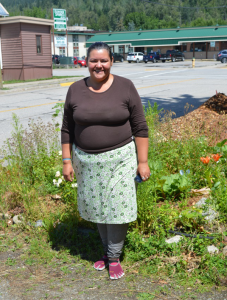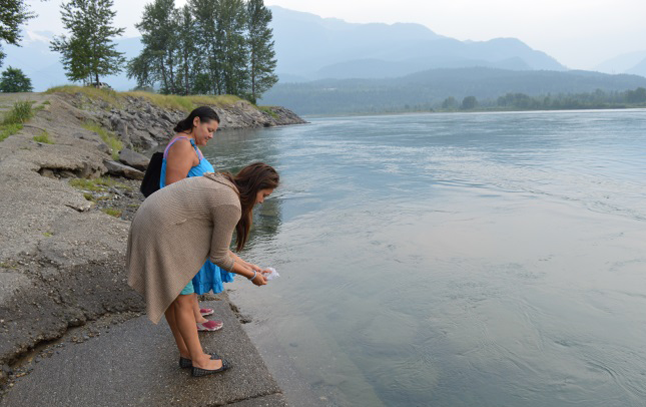
By Laura Stovel
This past weekend a solitary woman with two neat braids and five-finger shoes could be seen walking around the streets of Revelstoke and down by the Columbia River. Isabel Okanese, a 42-year-old Cree woman walked around Revelstoke as part of her cross- Canada walk to raise awareness about lateral violence between Aboriginal people.
Okanese left Victoria on May 5. Since she lost her support vehicle and companion walker she has been making up her kilometers within communities, rather than walking along highways. “To be by myself as an Aboriginal woman on the highway is not safe. I’m fearful that I’ll end up missing or murdered because of the missing and murdered Aboriginal women,” she explained.
Lateral violence (violence within a group) is an issue that is close to Okanese’s heart. “Growing up, my family was not part of the reserve,” she said. “We were disenfranchized about 100 years ago. So all my life I have not been accepted by my own people. Lateral violence has been a part of how I’ve been treated: ostracized and ignored and told I don’t look native, that I act white, look white, behave white, think white.”
“About 15 years ago I was talking to my friends and I said that we should have a walk where we would promote unity and bring people together – people who are non-status, like myself, with people who are status and people with various blood quantums. But they would say, ‘No, you shouldn’t do this. Who would listen to you?’”
Then last year, a 42-year-old Ojibway man, David James Taylor, walked from Victoria to Ottawa to raise awareness of violence within Aboriginal communities. His success inspired Okanese to do her own walk. Taylor is “not very athletic,” said Okanese, who describes herself as “plus size.” “I thought if James makes it to Ottawa, I can do my walk as well.” And he did make it – a day early, which she took as a sign that her walk was meant to be.
Okanese chose to do a walk because Aboriginal people “really take notice when people go walking. It’s a very spiritual and healing act to do. I was also thinking of the forced marches. People were displaced and forced to walk to a different location. So it was a way of regaining or healing from my ancestors being forced to leave” the Okanee Reserve in the Qu’Appelle Valley.
Okanese chose footwear that reflects her mission: bright pink five-finger shoes, which she describes as “like a very high tech sock.” The shoes are popular amongst followers of the Barefoot Movement, inspired by the indigenous Tarahumara people of Mexico who are known for running long distances barefoot.
“People are, in essence, decolonizing their feet by wearing minimalist shoes,” Okanese said. “I wanted to wear five finger shoes because I can actually feel the heat of the ground. I can feel if it’s moist or not. I can feel the rocks. I would much prefer to walk in moccasins but this is my modern moccasin. I feel it’s another way of honouring my ancestors because they walked across Turtle Island (North America) in moccasins. Since wearing my five-finger shoes I actually feel more connected to Mother Earth and my ancestors.”
Okanese left Revelstoke on Monday and headed to Edmonton. She said she enjoyed her stay in Revelstoke, which “has a lot of character. A lot of places are losing their character but Revelstoke has a nice downtown, homey feel to it.”



